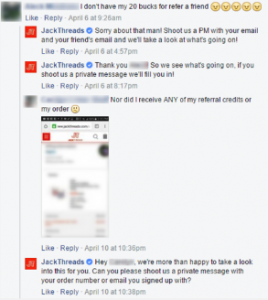If you’ve ever hired an online marketing agency, odds are that you’ve considered firing an online marketing agency, too. In fact, the Agency Management Institute reports that half of companies currently using an agency have switched agencies during the last 2 years.
Now, don’t get me wrong, I think agencies are great. In fact, I own one, so I could write at length about the advantages of using an online marketing agency (better price point, broader and better skill set, etc).
The fact of the matter, though, is that working with an agency does not guarantee online marketing nirvana.
Sometimes the results aren’t there. Sometimes you hate your account manager. Sometimes your business simply changes.
Regardless of the specific reason behind your agency woes, most companies seem to question their agency relationship at one point or another. But is changing agencies the answer? Or should you stick things out and make it work?
To help you answer these crucial questions, I’m going to take off my agency hat and talk about 3 common reasons why companies fire their agencies, along with the best way to deal with each of these situations.
#1 – The Results Aren’t There
According to the Agency Management Institute, 46% of companies fire their agency because the results simply aren’t there.
If you think about it, this seems like a pretty good reason to fire a marketing agency. After all, you’re paying for results. If you aren’t getting the results you need, do you really need your agency?
But things aren’t always quite so simple. Here are a few questions to ask yourself before you give your agency the axe:
Are my expectations clear?
Often, business owners or marketing directors haven’t really hammered out what a successful agency relationship looks like. They have a vague sense of what they want (“I want more sales!” or “I need a lower cost-per-lead!”), but that’s about as clear as their expectations get.
Unfortunately, if your expectations aren’t clear (either to yourself or your agency), it will be hard for your agency to meet or exceed your expectations. As a result, you end up frustrated, your agency ends up frustrated and you don’t get the results you need—even if your agency is fully capable of doing what you needed them to do!
In this situation, changing agencies won’t fix the problem. No matter how good your new agency is, if you don’t give them clear-cut goals and objectives, they’ll struggle to produce the results you’re looking for.
So, if you haven’t been clear with your agency about what success looks like, set up a meeting and discuss what really matters to your business. Set some reasonable expectations and see if your agency can meet your goals.
If they succeed, you’ve solved your real problem. But, if they continue to fall short, it’s probably time to pull the plug and look for a new agency.
Do I have realistic expectations?
Now, if you have that conversation and your expectations are that you should be able to spend $ 1,200 on Facebook ads for a product that sells for $ 25 a piece and make $ 150,000/month, you’re still setting your agency up to fail.
Hopefully, those figures seem crazy to you, but I’m often amazed at what people think an online marketing agency can do for their business.
A good agency will tell you if your goals are achievable or not, which is part of the reason why clarifying your expectations with your agency is so important. Odds are, if your agency tells you that your expectations are unreasonable, you need to adjust your expectations, not fire your agency.
On the other hand, if you and your agency agree that your expectations are achievable, but the agency doesn’t deliver within a reasonable timeframe, you should probably start shopping around for a new agency.
#2 – The Relationship Isn’t There
As important as results are, they aren’t the only reason why you might be considering changing agencies. After all, if a root canal seems preferable to another call with your account manager, it might seem like your results don’t justify the agony of working with your agency.
While this is certainly understandable, ask yourself the following before you call it quits:
What’s the real problem?
Let’s face it, your business and your agency are fundamentally different. You have different values, goals and success metrics. Same goes for you and your account manager.
Those differences can create conflict in your relationship, but they can also help you get much better results from your marketing.
For example, you might really care about driving traffic to your site, but your account manager is focused on driving conversions. As a result, if your traffic is going down, but your conversions are going up, you might end a call feeling frustrated because your account manager is celebrating something that doesn’t really matter to you.
The best way to resolve this problem is to simply sit down and talk with your account manager. Make sure your goals, priorities and success metrics are clear, so that the account manager knows how to get you the results you care about.
As you discuss priorities, however, keep an open mind. Your account manager may have very good reasons behind what they are doing, so it’s likely that the best marketing approach for your business will be a hybrid between the two approaches.
When push comes to shove, though, keep in mind that you’re the client. What you value most is what your agency should be focused on. If they can’t get on board with that, maybe you need a new agency.
Is this a personality conflict?
The differences between you and your account manager aren’t just limited to marketing goals.
For example, if you only care about the big picture and your account manager is stuck in the details, that can create a lot of conflict. A good agency will understand this and they should be willing to change your account manager.
After all, if you have a hard time working with your account manager, they probably don’t like working with you, either.
Keep in mind though, that like attracts like. Many agencies are primarily staffed by people with similar personalities. So, if you’ve tried out 2-3 account managers and still can’t find a decent match, you might be better off finding a new agency.
Am I out of the loop?
Unlike the previous two questions, feeling out of the loop is almost always a bad sign. In most cases, that means you either have a crummy account manager or your agency is trying to hide the fact that they aren’t really doing anything for your business.
Of course, accidents happen and balls get dropped, but if you’re constantly wondering what your agency is up to, you’ve probably got the wrong agency.
3. Your Business Need Isn’t There
While results and relationships are at the heart of most agency changes, it’s important to recognize that your business needs are constantly changing.
Running a business is a complex process and new challenges arise all the time. If those new challenges require you to cut your marketing budget, you might be forced to consider firing your agency.
When this happens, the key is to figure out exactly why you need to change agencies. Then, talk to your current agency and see if you can adapt your contract to fit your new situation. Even if you can’t get something worked out with your current agency, they may be able to refer you to a new agency that is a better fit.
To Fire or Not to Fire?
Choosing to fire or continue working with your agency is a tough decision. If things aren’t working well, there’s a natural inclination to just run away from the situation and hope your next agency works out better.
However, if the root of your problems is really you, changing agencies won’t fix anything.
To be successful with any agency, you need to figure out what you do and don’t want from your agency relationship. Then, you need to be upfront about that with your agency and if the two of you can’t work something out, you’re probably better off finding a new agency.
Digital & Social Articles on Business 2 Community(19)
Report Post



